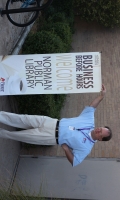Business Services at the Pioneer Library System
Portland Public Library, Maine
Innovation Synopsis
The newly created Business Services Department provides comprehensive support for small businesses, emerging entrepreneurs and job seekers across the 11 library communities served by utilizing strategic partnerships with local and state resources, business training kits, 1-1 appointments, and computer classes on market research databases, job seeking skills and resume review.
Challenge/Opportunity
Long recognized as a hub for free and unbiased resources and information, the libraries of the Pioneer Library system lacked a dedicated department that would train and provide resources to the small business communities that existed in our service area. Through focus groups and needs assessments conducted as part of an Urban Libraries Council Executive Leadership Institute project the position of Business Services Coordinator was created and quickly expanded in the next few years to an additional two full time staff with service responsibilities for five branches each. Additional trainings through ALA RUSA and BRASS were included for the new department staff. At a time when many small businesses were forced to downsize or lay off employees with the downturn in the economy the libraries experienced an increase in the number of job seekers needing skills such as resume building and interviewing skills. At the same time businesses were seeking ways to do more with less. The business services staff surveyed businesses on their biggest training needs and skills gaps that their employees were facing then spoke with potential new business owners about their biggest challenges they were facing navigating the vast array of resources spread out across the state when seeking assistance. The business services staff then created a suite of services, programs and tools that would address those needs as requested.
Key Elements of Innovation
Surveys and interviews were completed with business owners, job seekers and frontline library staff. Print and downloadable collections were weeded and refreshed across the system while new business databases such as Reference USA and Business Decision were purchased and new public trainings created. Business training kits containing training DVD’s, workbooks and discussion guides on topics such as customer service, managing multi-generational workforces and ethics in the workplace that would check out for six weeks at a time were created. These kits directly addressed the needs of small business owners who lacked the funds to send employees to outside trainings and did not have their own internal HR departments. A hybrid staffing model that allowed business services staff to train other librarians but also to be available at each of the 11 libraries for one on one appointment was developed. These 1-1 appointments allowed the staff time to do database trainings and to assist with resources for business plans, financials and marketing plans and to tailor referrals to local and state resources. Business resource centers in two of the largest libraries and specially identified collections were created. New partnerships for programs were pioneered with area Chambers of Commerce, economic development authorities, business and industry councils, municipal leadership programs, higher education institutions, business incubators and groups like the Rural Enterprises Inc. Women’s Business Resource Center. Business and life skills classes were debuted focusing on resume building, interviewing skills, writing business letters, thank you notes and proper meal etiquette during a business lunch or dinner for high school and college students. Staff have helped at job fairs, reviewed resumes and assisted with conducting mock interviews at area events.
Achieved Outcomes
Staff worked hard to allay concerns of the library “taking business” from other groups that were also doing education programs and were able to show how partnering could increase the marketing of their services and expand their customer base. For many of these organizations it was the first time they had worked together across service boundaries to reach new customers. Popular Women’s Business Networking breakfasts average between 50 and 60 attendees in Oklahoma City while the Noble library now hosts a monthly Business for Breakfast event. Business book clubs and Business Before and After Hours programs in partnership with their local Chamber of Commerce remain popular. The SOKC Library was recently recognized as the Volunteer of the Year in S OKC Community for support of Chamber and small business activities. Customers have learned how they can run their businesses from the library using the meeting rooms for job interviews, library computers, scanners, and free wifi. Demographic research in the S OKC library community revealed that retiring professionals may be interested in starting their own businesses. The resulting Encore Entrepreneurship program targeted seniors interested in starting new businesses. One such participant attended a library class, learned of the small business incubator next door and used library resources to successfully complete his application. Green Okie is a new outdoor living business concept housed in the business incubator next door to the library and is giving back to the local economy. The owner credits the library for helping him create his successful business!



